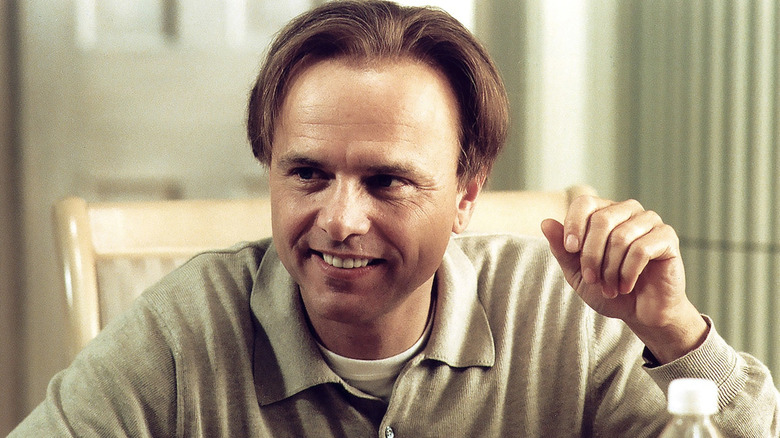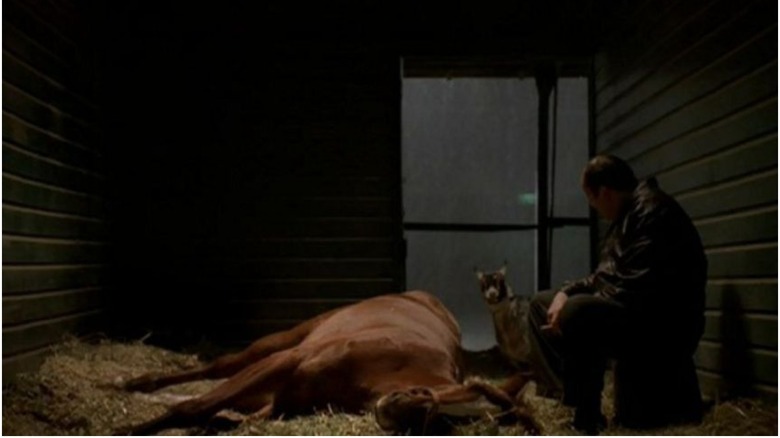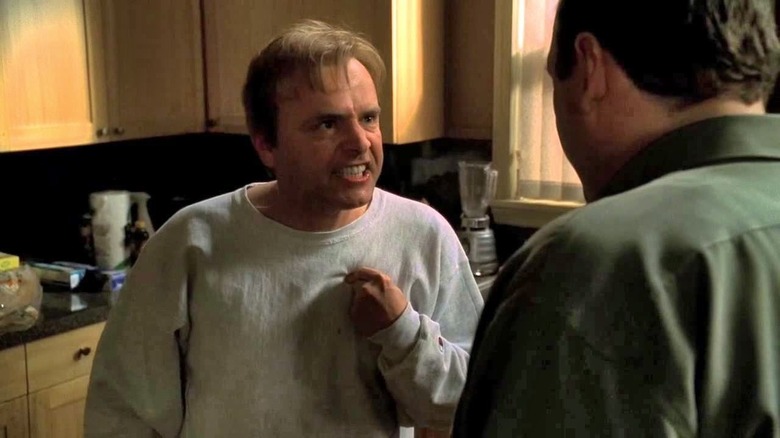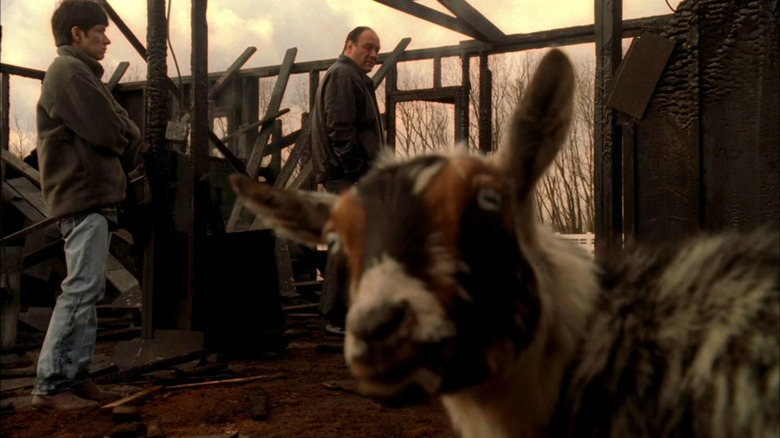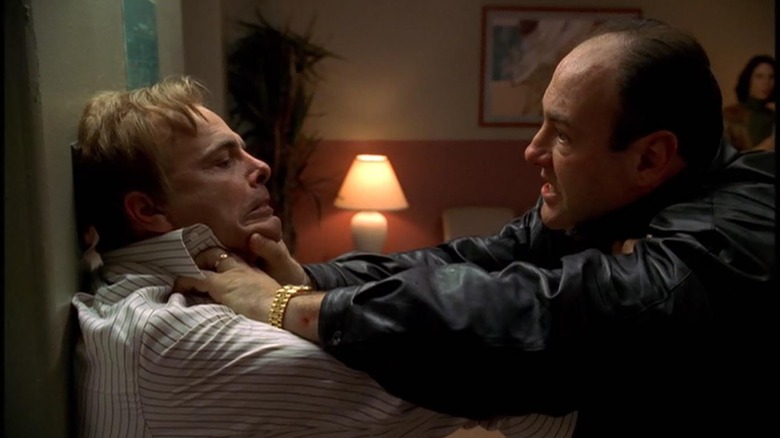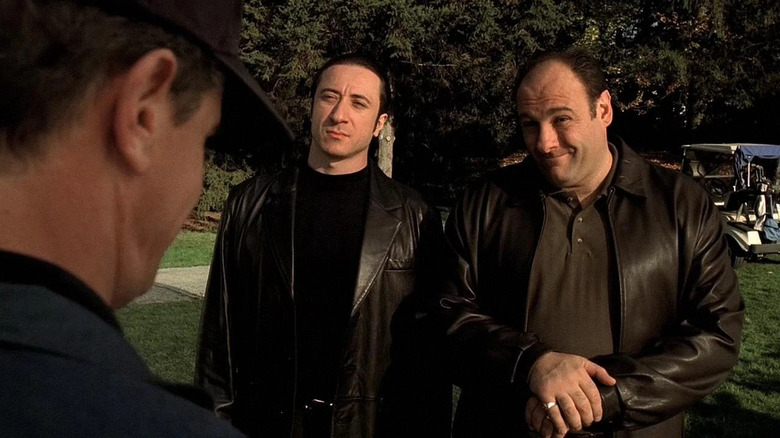David Chase And Joe Pantoliano Disagree On This Sopranos Mystery
One of the reasons that "The Sopranos" has endured even as its Prestige TV imitators fade away is that its creators knew when to be ambiguous. The series never holds its audience's hand, which makes for rewarding repeat viewings. 15 years later, we're still talking about what the cut to black which ended the series finale, "Made in America," means. That's far from the only mystery in the show, though.
During seasons 3 to 4, the biggest rock in Tony's shoe is Ralph Cifaretto (Joe Pantoliano). Tony can't stand "Ralphie," particularly after the psycho kills his own 20-year-old, pregnant stripper girlfriend Tracee (Ariel Kiley) in "University." Still, Ralph brings in too much money for Tony to get rid of him — until Season 4's "Whoever Did This." Midway through the episode, a horse named Pie-O-My that Tony and Ralph co-owned dies in a barn fire. Tony suspects Ralph set the fire to collect the insurance money, but Ralph denies it. The confrontation escalates and Tony beats him to death, shouting, "She was a beautiful, innocent creature! What did she ever do to you?!" as he pummels Ralph on his own kitchen floor.
In the world of the mafia, animal abuse is a faux pas at best, but it's what does Ralphie in. At least, assuming he did actually set that fire. This question divides not only the show's fans, but its makers.
David Chase's opinion
"The Sopranos" creator David Chase isn't always the most forthcoming, but for this question, he's made an exception. Critics Matt Zoller Seitz and Alan Sepinwall interviewed Chase seven successive times for their book, "The Sopranos Sessions." In Session #4, Sepinwall asks Chase if Ralph set the fire which killed Pie-O-My. Interestingly, Chase initially answered no, but it seems this was a slip of the tongue because he reversed course a moment later, "I take that back! I think he did burn it down. That was the intention."
When Chase appeared on the finale of the podcast, "Talking Sopranos," Steve Schirrippa (the actor who played Bobby Bacala) asked Chase the same question as Sepinwall had. This time, he was even more blunt: With only two seconds of hesitation, Chase confirmed the theory once again. "Yeah."
Ralph setting the fire is the obvious conclusion since there's no one else in the episode with a compelling motive to do so. Indeed, during "David Chase Session #4," Seitz, taken aback by Chase's initial recanted answer, said, "I never even considered that he didn't burn it down." Still, the episode gives Ralph enough plausibility deniability that some maintain he didn't kill Pie-O-My. One of those people is the man who played Ralph, Joe Pantoliano.
Joe Pantoliano's take
In the 2007 Vanity Fair feature, "An American Family," Pantoliano revealed that Chase wouldn't give him the answer to Ralph's guilt. So, he chose to play his final scene as if Ralph was innocent. He reiterated this in a 2012 interview with The Tommy Edison Experience. Describing Tony and Ralph's fight, Pantoliano said, "They're fighting and scratching and clawing at each other and it's over the indignation that Ralph has for being accused of killing a horse, when in fact he didn't kill the horse, he says, 'I didn't kill this horse you f***ing miserable piece of sh*t.'"
Knowing Pantoliano's mindset makes the scene play differently. Some of Ralph's lines which might come across as deflection instead register as frustration. Some context: Earlier in "Whoever Did This," Ralph's son Justin is injured in an accident. During his last scene with Tony, Ralph initially tries to steer the conversation towards his son's recovery, but Tony keeps going back to the horse. That's when Ralph drops the niceties. Is this Ralph abandoning a ploy to steer Tony away from his guilt, or is he genuinely angered that Tony cares more about an animal's well-being than his son's?
The Verdict
As a humble viewer, I'd say the circumstantial evidence points to Ralph being guilty. Yes, the episode never actually shows him do it and he denies it, but doing it and then denying it is absolutely the sort of thing Ralph would do.
A lot of his dialogue also reads as him trying to defend himself without admitting his guilt. He tells Tony, "We got lucky ... the horse was no f***ing good." He immediately follows up his denial with, "But so what?", before calling out Tony's hypocrisy. The man's a murderer, but is up in arms about a horse's death. Plus, as Ralph notes, "What are you, a vegetarian? You eat beef and sausage by the f***ing car load!"
In the Seitz/Sepinwall interview with Chase, the three all note the presence of a goat at the scene of the fire as evidence against Ralph. Goats have historically been associated with Satan, as was Ralph throughout "The Sopranos." "Whoever Did This" even works lyrics from "Sympathy for the Devil" into its dialogue; Justin's accident means "Sympathy for the Devil" is what Tony and the viewer are feeling for Ralph for the first half of the episode.
Despite this, part of me wants to believe he didn't do it — not because I was rooting for Ralph's redemption, but because of the irony. If Ralph was innocent, that means one of the worst scumbags on the show, who had already narrowly dodged death a few times, was finally killed for something he didn't even do. That's a turn of events perfectly in line with the black comedy and purposefully anti-climactic storytelling of "The Sopranos."
Why'd Tony do it?
Within this mystery is wrapped another: What was the tipping point that made Tony kill Ralph? Was it Pie-O-My, Tracee, or some combination of the two? Tony's dialogue when beating Ralph can be read multiple ways. "Whoever Did This" also ends with Tony, having cleaned up after disposing of Ralph's body, looking at a picture of Tracee at the Bing.
On "Talking Sopranos," Chase elaborated about Tony's mindset. "Tony had it right, but the thing is, when he was beating up on Ralphie for killing Pie-o-My, it was really about that girl who [Ralph] killed, Tracee." Frankly, Chase's answer is the least interesting interpretation of the scene for me, because it's the most black and white, underlining Tony's (comparatively) good and in opposition to Ralph's evil. Viewing Tony's actions as avenging Tracee gives the scene a cathartic edge, but it runs counter to the series' larger point that Tony Soprano is not someone we should be rooting for.
It's also important to remember that in "University," Tony was dismissive of Tracee before her murder. Any affection he had for her came post-mortem because she happened to be the same age as Tony's own beloved daughter Meadow (Jamie Lynn-Sigler). Conversely, in the following episode "The Strong, Silent Type," Tony breaks down in tears over Pie-O-My's death. Dr. Melfi (Lorraine Bracco) even observes that he's grieving more for an animal than he ever has for a human being.
One interpretation I find particularly compelling is that it wasn't Tracee or Pie-O-My that was the tipping point. Tony just couldn't stand a man he hated calling out his hypocrisy. That's the type of behavior that's most in line with Tony, the impulsive murderer we know and love to hate.
Second opinion
It's not just Chase and Pantoliano who come down on opposite sides. According to the audio commentary of "Whoever Did This," so do episode writers Robin Green and Mitch Burgess. Green says Ralph did it, while Burgess feels that he didn't. This disagreement in the writers' room, where the blueprint of the episode was built, is no doubt the root of the ambiguity in the final episode.
These splits also raise larger questions about how a text should be read. Roland Barthes' famous essay "Death of the Author" argued that an author's intent or biography should not define how their work is interpreted. This mindset is useful for analyzing collaborative art like film and television, which lack the singular authors that literary texts have.
But then, whose word is the most sacred? The one who writes the words or the one who interprets and delivers them? Or is it the audience who receives them? I'd say it's the latter, because the only final authority on how one reads a piece of art is that person: Even if a viewer abides by the author's intention, they're making a conscious decision to do so. That's why great art, like "The Sopranos," is that which lends itself to different, even competing, interpretations — and the death of Ralphie Cifaretto is wonderfully emblematic of that idea.
